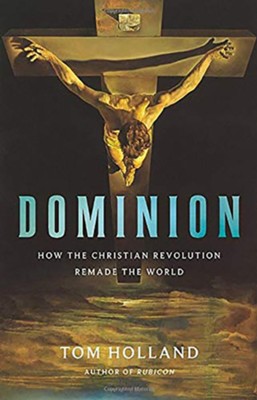Rather than a history of Christianity, Tom Holland’s six-hundred-page Dominion is more a series of historical essays. His purpose is not to provide “objective,” even coverage of the key events, people, and trends of the last two thousand years but to make a point.
And the point? The ideas that “human beings have rights; that they are born equal; that they are owed sustenance, and shelter, and refuge from persecution”—all these, whether proclaimed by atheists or believers, derive historically from the Bible’s claim that humans are made in the image of God, that Christ died for everyone, and that in him there is neither Jew nor Greek, slave nor free, male nor female (540). We are all heirs of the Christian revolution.
He tells his impressionistic history through the use of vivid, selective stories from the past which are sometimes obscure (e.g., Quaker Benjamin Lay) but which he sees as representative of an era, epitomizing the theme he wants to emphasize.

Though he makes a positive case for the influence of Christianity in the world, he does not stint on bloodshed. Over and over he tells how Christians perpetrated violence and death against others and each other in likely every period since Constantine. The book is no whitewash.
Along the way he seems to make some odd choices, however. Though the book emphasizes the critical importance of the place of natural law, Holland barely spends two pages on Thomas Aquinas, likely the most influential theologian in all of church history who lifted natural theology to a place of near supremacy. Yet Holland finds time to spend six pages on Spinoza.
And then there is the peculiar claim that Irenaeus invented the canon when much consensus in the early church already existed on which books should be in the New Testament. Such swashbuckling analysis about something I know makes me wonder about his other judgments regarding things I know less well.
He is a lively storyteller who makes the pages fly by. Yet while I appreciate his efforts at artistry, his poetic prose too often lapses into obscurity. Or to put it more plainly (as I wish he did more often): his ornate sentences are sometimes so convoluted that it can be hard to understand what he means.
So, yes, while I see merit in the book’s overall thesis, a three-star rating accurately reflecs my ambivalence.
